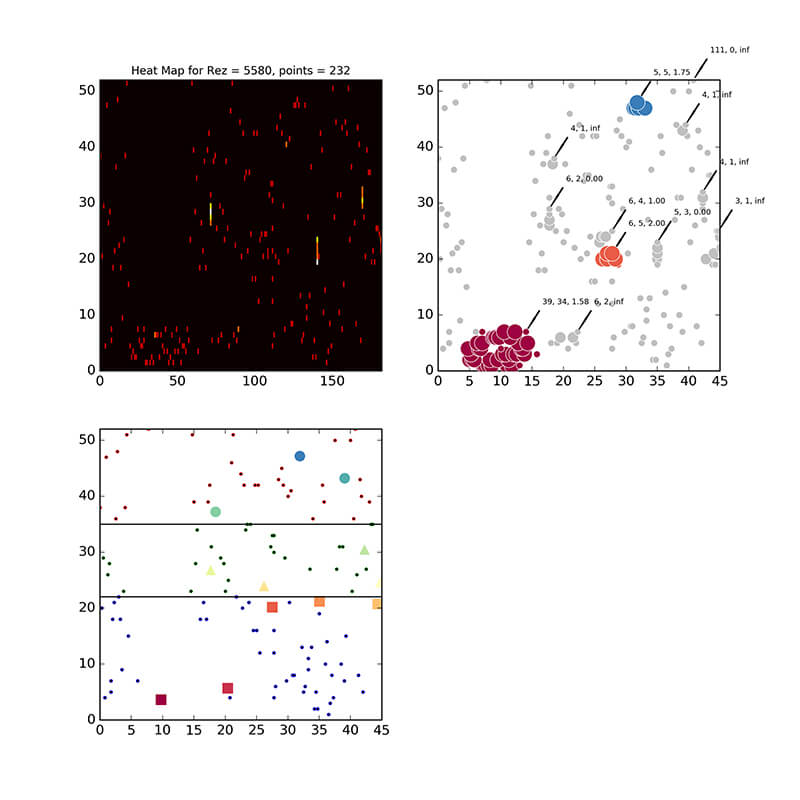July 15, 2018
Who cares? New technology helps answer a big question about big data for educators
 Purdue University researchers have developed an algorithm that sorts digital data and formats it into a 2D time and space heat map. (Image provided)
Download image
Purdue University researchers have developed an algorithm that sorts digital data and formats it into a 2D time and space heat map. (Image provided)
Download image
WEST LAFAYETTE, Ind. – Purdue University researchers have developed a new way to track the effectiveness of online learning programs, speeches and businesses, and determine if anyone really cares enough to download the material.
The Purdue team developed an algorithm that sorts digital data and formats it into a 2D time and space heat map.
“Lots of times it can be difficult for someone such as an educator to determine if their online course or digital supplements to classroom lectures are being used by students,” said Dwight McKay, a senior data science engineer for Information Technology at Purdue (ITaP), who helped lead the research team. “We basically just need to know when the user came to the site and their IP address, a numeric designation that identifies a location on the internet. We can turn all of this big data and massive amounts of information into actionable numbers.”
The algorithm takes the date and IP address information and transforms it into a data set that can be easily visualized and used by an image program to create the heat map. The map is a grid of colored boxes, which visually show information that occurs at specific times and locations.
Educators can use the heat map and data information to determine if online lectures or supplemental material is being used in classrooms. Speakers could use the technology to see if people think their work is valuable enough to download online. Businesses would be able to use the Purdue technology to track website effectiveness.
“Before our tool, it was really difficult for sites that don’t require a login or account setup to determine if a piece of downloaded content was being used by students and in the classroom,” McKay said. “Now, we can allow organizations and businesses to quickly recognize behavioral patterns and trends in the data and use those to understand how their material is being used for education. It’s an improved way Purdue can help people tell stories about their data.”
McKay and the other researchers began work on the technology for Purdue’s Network for Computational Nanotechnology's nanoHUB site, a scientific cloud-computing environment. They used the algorithm technology to determine which of nanoHUB’s more than 6,000 content items were being used in education through the identification of classroom groups.
“We were able to clearly show the effectiveness of nanoHUB, which is paramount for continued funding,” McKay said.
The National Science Foundation provided funding for part of the research.
Researchers have worked with the Purdue Office of Technology Commercialization to register copyright protection for the source code. The technology is available for interested partners to license it.
About Purdue Office of Technology Commercialization
The Purdue Office of Technology Commercialization operates one of the most comprehensive technology transfer programs among leading research universities in the U.S. Services provided by this office support the economic development initiatives of Purdue University and benefit the university's academic activities. The office is managed by the Purdue Research Foundation, which received the 2016 Innovation and Economic Prosperity Universities Award for Innovation from the Association of Public and Land-grant Universities. For more information about funding and investment opportunities in startups based on a Purdue innovation, contact the Purdue Foundry at foundry@prf.org. For more information on licensing a Purdue innovation, contact the Office of Technology Commercialization at innovation@prf.org. The Purdue Research Foundation is a private, nonprofit foundation created to advance the mission of Purdue University.
Purdue Research Foundation contact: Chris Adam, 765-588-3341, cladam@prf.org
Source: Dwight McKay, mckay@purdue.edu

